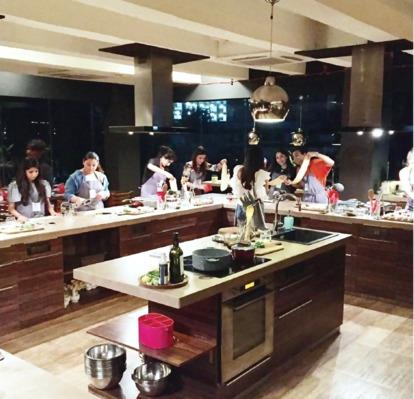

Anjali Pathak est la fondatrice, propriétaire et inspiration derrière Flavour Diaries : un atelier de cuisine moderne et high-tech situé dans le nord de Bombay, à Khar. C’est un endroit inondé de lumière se reflètant sur d’élégantes finitions chromées haut de gamme. Les stations de cuisson et les plans de travail sont ordonnés en forme de fer à cheval, plaçant Anjali au centre de l’action. Cette dernière fait voyager ses élèves à travers un éventail de cuisines allant du bistro français au street food indien, tout en passant par la cuisine japonaise et la pâtisserie.

Flavour Diaries entame sa quatrième année. Ce concept, animé par une Anjali dynamique, folle de travail et particulièrement attentionnée aux détails s’est prouvé être très fructueux. Le prénom d’Anjali sonne indien, cependant dès qu’elle entame la conversation, son accent trahit ses racines du nord de l'Angleterre. Dans le monde culinaire anglais, le nom Pathak est synonyme d’une marque de sauces et épices ainsi que de plats préparés qui est bien établie et très prospère. Anjali est la petite-fille des fondateurs de Patak et la cuisine est une passion qui coule incontestablement dans le sang familial.

Les femmes de sa famille ont joué un rôle extrêmement important dans le modelage de l'éthique professionnelle et de la motivation d’Anjali.
Sa grand-mère, quoique indienne, grandit en Afrique. Un déménagement tardif au Royaume Uni, accompagné d’un chamboulement culturel la poussa à se tourner vers l’unique constante dans sa vie : la cuisine. La renommée de ses plats se répandit rapidement, et c’est ainsi qu’ayant commencé comme cuisinière amatrice, elle ouvrit d’abord un magasin puis bâtit un empire culinaire. Anjali évoque avec beaucoup de respect l'énergie ainsi que l’instinct de survie de sa grand-mère, qui tout en étant confrontée à une nouvelle culture, dut élever six enfants sans cesser de trouver de nouvelles idées et recettes pour son business bourgeonnant.
Sa mère, nouvellement mariée, arriva en Angleterre à tout juste 19 ans. Anjali voit cette dernière comme une véritable entrepreneuse qui apporta avec elle son assiduité au travail ainsi qu’une détermination à contribuer à l’entreprise familiale. Bien que n’étant pas un chef professionnel, la mère d’Anjali potassait néanmoins les recettes tout en aidant à la gestion de la société, avant de rentrer à la maison et de préparer le dîner pour toute sa famille. Anjali se souvient qu’elle et ses frères et sœurs durent apprendre à tracer leur propre chemin. Ils se rendaient dans les locaux de l’entreprise familiale, observaient comment la nourriture était préparée et purent ainsi apprendre le métier de A à Z. Anjali put s’essayer à la gestion d’une entreprise dans un environnement particulièrement positif et, bien qu’elle ne subît pas la pression de se joindre au commerce familial, elle décida toutefois de suivre les pas de sa mère et de sa grand-mère.

Pourquoi quitter Londres ainsi que sa petite vie tranquille pour les terres inconnues de Bombay ? Anjali aurait en effet tout aussi bien pu fonder son école de cuisine au Royaume-Uni où elle était déjà bien établie sur la scène culinaire. La réponse est double.
Pourquoi l’Inde ? Car c’était la cuisine indienne qui avait tant donné à sa famille et on lui avait appris l’importance de restituer.
Pourquoi pas Londres ? Car Anjali avait déjà commencé à explorer de nouveaux secteurs après la vente de la société par sa famille. Elle continua à y travailler sous la nouvelle direction, mais décida ensuite de se lancer des ses propres ailes. Grâce à son travail acharné, elle bénéficiait du respect de l’industrie ainsi que d’une certaine notoriété, allant même jusqu’à travailler avec des chefs tel Jamie Oliver. Cependant, Anjali refusa de se faire coller une étiquette de spécialiste de la cuisine indienne, mais cela fut difficile de sortir du moule étant donné son nom de famille. Elle décida donc de quitter l’Angleterre afin de faire naître son idée d’une école culinaire dans un environnement nouveau. L’Inde était un endroit familier néanmoins démuni de toute préconception la concernant elle et sa cuisine, c’est donc là qu’elle decida de s’installer.
Cependant, monter un business de zéro en tant que femme dans l’industrie alimentaire n’a pas été une aventure des plus faciles. Dans cet univers culinaire très masculin, Anjali fait figure d’exception. À ses débuts, elle était seule, recherchant un emplacement pour la cuisine, concevant et dirigeant le projet de l'évolution de l’espace elle-même. Elle eut le sentiment que ses interlocuteurs (des fournisseurs aux constructeurs) s’attendaient toujours à ce qu’il y ait un homme derrière elle, la finançant. Ayant l’impression qu’il y a une perception inhérente de la femme comme plus faible que l’homme, Anjali s’efforça de leur prouver le contraire. Les ouvriers du chantier l’auraient mieux écouté, si elle avait été un homme. Cependant, elle réussit graduellement à instiller son autorité et son entreprise fut enfin opérationnelle. Au début, Anjali faisait tout elle-même et jonglait entre les rôles de chef, de plongeur, d’intendant (commandes des produits) et de réceptioniste (prise des réservations clients). Elle peut aujourd’hui souffler un peu car sa société est maintenant bien établie et l’équipe s’est agrandie.
Pense-t-elle que son entrepreneurisme a déteint sur les femmes qui ont travaillé pour elle ? Anjali préfère croire que la leçon la plus importante qu’elle ait pu inculquer à ses employés est qu’il faut travailler dur afin de réussir. On lui a souvent répété qu’elle est considérée comme un modèle d’inspiration, ce qui l’étonne. Cependant, lorsque l’on réalise qu’elle s’est forgée une réputation toute seule et qu’elle a bâti son entreprise avec intégrité et grâce, cela n’est peut-être pas si surprenant.
Flavour diaries - email : hello@flavourdiaries.com - +91 98201 43404
For our English readers:
Anjali is the founder/owner/inspiration behind Flavour Diaries … a high-tech modern cooking space in Mumbai’s northerly suburb, Khar. The space is flooded with light which reflects off the sleek chrome of the high-end fit. Cooking stations and prep areas are arranged in a continuous horse shoe facing centre stage where Anjali takes her students through a menu which can range from French bistro to Indian street food, Japanese to baking.

Flavour Diaries is into it’s fourth year. It’s proved to be a very successful concept, driven by the energetic, work-driven, detail-oriented Anjali. Anjali’s name is Indian but as soon as she starts a conversation her accent betrays roots in the north of England. In the food world, the Pathak name is synonymous with a well established and very successful brand of sauces and spices and ready to go meals. Anjali is grandaughter of the Patak founders and food is most definitely a passion that has passed down the gene pool.
The women in her family have played extremely important roles in shaping Anjali’s work ethic and her drive. Her Grandmother, though Indian, grew up in Africa. A later move to the UK came with all the challenges of relocating to a totally different culture, so Anjali’s Grandmother turned to the one constant in her life … cooking. Word spread about her food and from home cook, a shop was opened and a food empire founded. Anjali speaks with great respect about her Grandmother’s drive and survival instinct, having to adjust to a new culture, look after her six children and keep up with recipes and ideas for the burgeoning business. Her mother came to the UK when she was just 19 years old as a new bride. Anjali sees her mother as a true entrepreneur. She brought with her a hard-working spirit and a commitment to contributing to the family business. Though not a trained chef, Anjali’s mum worked on recipes as well as helping to run the business, then cooking dinner for the family every night. Anjali recalls that herself and her siblings were taught they had to earn their way in life. They went to the office and literally saw how the food was put on the table, learning the business from top to bottom. Anjali could see the affect of running a business with such a positive working environment and although there was no pressure to join the family firm, she decided to follow in the footsteps of her mother and her grandmother.

Fast forward to India, and an obvious question, why leave London and her life there for the unknown territory of Mumbai. Anjali could just as easily have set up a cooking school in the UK where she had a high profile and was already established on the food scene. The answer is two-fold. Why India? Because it was Indian food that had given the family so much. And she had been taught the importance of giving back. Why not London? Because Anjali had already started to branch out after the family sold the business. She had continued to work under the new ownership then saw an opportunities to explore her own ideas. Through her hard work she had earned industry respect and a high profile, working with the likes of Jamie Oliver. But Anjali didn’t want to get pigeon-holed for cooking only India food and it was hard for her to break out of the mould considering her family name. So she decided to look overseas to establish her idea of a cookery school. India was familiar, and here she had a clean slate to cook whatever she wanted without preconceptions.
However the practicalities of starting a business as woman in the food industry, from scratch, has been a hard journey. As a woman in food, Anjali is the exception not the rule. In the early days she was a one woman band, scouting for a site for the kitchen and designing and project managing the evolution of the space. She felt that whoever she was interacting with - from suppliers to builders, expected there to be a man bankrolling and supporting her. She feels there is an inherent perception here that women are weaker and Anjali felt a pressure to prove this was wrong. She feels the workmen on site would have listened better if she was a man but gradually she instilled her authority and got the business up and running. At these early stages, Anjali was everything from chef to bottle washer doing everything from ordering food to booking clients. She now is able to take her foot off the pedal - a little - as the business has become established and the staff has grown.
Does she think any of her entrepreneurism has rubbed off on any of the women who have worked for her? Anjali would like to think the most important lesson people learn from her is that if you don’t put in the hard work you will never get anywhere. She has been told she is admired as a strong role model. Which surprises Anjali, but considering she has built a name for herself, under her own steam … built an empire with integrity and grace … perhaps this shouldn’t come as a great revelation.








